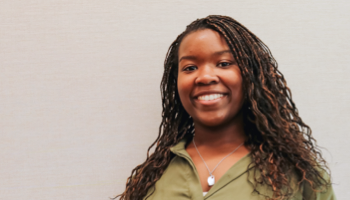HOW CAN WE HELP YOU? Call 1-800-TRY-CHOP
In This Section
Varying Backgrounds: Q&A With Mallory Perry, PhD, RN, New Diversity Fellow

Children’s Hospital of Philadelphia views diversity as a key driver of achievement, particularly when innovation is critical. As a way to enhance the recruitment of a diverse population of postdoctoral fellows, the Office of Academic Training and Outreach Programs at the Research Institute established the Postdoctoral Research Fellowship for Academic Diversity in partnership with the University of Pennsylvania, offering fellows from CHOP and Penn the opportunity to form a cohesive cohort and take advantage of programming and support at both institutions.
This year, we met three new diversity fellows who were introduced by their mentors at the Nov. 1 CHOP Postdoctoral Fellowship for Academic Diversity Welcome Luncheon. Get to know them here, in a three-part Q&A series, where our newest postdoc scholars share what diversity means to them.
First up: Mallory Perry, PhD, RN, is a nurse scientist working with her mentor, Martha Curley, PhD, RN, FAAN, a professor in Nursing Science at the University of Pennsylvania’s School of Nursing, who holds the Ruth M. Colket Endowed Chair in Pediatric Nursing at CHOP.
Tell us about your background and what compelled you to apply for the Postdoctoral Research Fellowship for Academic Diversity.
My background is in pediatric critical care nursing. After working in a pediatric intensive care unit (PICU) for several years, I realized I had more questions than answers about critical care outcomes, and that was unsettling for me. In an effort to solve some of these questions, I pursued my PhD in nursing science, with emphasis on biobehavioral research. In my final year of doctoral study, I realized I needed additional training and mentorship to achieve my career goals in conducting large, multi-site trials focusing on long-term outcomes of PICU hospitalization.
When searching for a postdoctoral position, there were two main things I was looking for: an institution with a strong commitment to pediatric research and an excellent mentor. I found both at CHOP through the Postdoctoral Research Fellowship for Academic Diversity.
I was drawn toward working with Dr. Curley because she is a true pioneer in pediatric critical care nursing. As a PICU nurse, I use instruments created by Dr. Curley to assess sedation, withdrawal, and pressure injury risk daily in my practice. It felt like an honor that she even took the time to email me back! I’m very thankful that Dr. Curley agreed to take me on as a mentee, and from there, the rest is history.
What inspired you to focus on Critical Care Pediatric Nursing? What do you aim to achieve with your research?
For the last five years, I’ve worked as a PICU nurse in Connecticut, caring for some of the sickest children in the state. I saw a variety of diagnoses and conditions, including, but not limited to, cardiothoracic surgery, traumas, acute respiratory illness, and neurosurgery.
This career has been very fulfilling, but I always wondered, what happens to the kids after they leave our care? We perform lifesaving interventions every day, but at what expense to the child’s long-term quality of life? This is what got me into research and prompted me to get my PhD in nursing science. Building upon my critical thinking skills and nursing practice, I hope to inform care of critically ill children to improve upon their overall healthcare quality of life post-discharge.
What does diversity in research and science mean to you?
Being a black woman, as well as a nurse, makes me quite diverse in the biomedical research realm. The importance of diversity in research is that we each have varying backgrounds to draw upon. Whether these varying backgrounds are scientific, professional, or cultural, these experiences shape the way in which we approach problems and questions. It is highly beneficial to look at a problem from another angle or lens, which we alone may not possess. Rich diversity is vital to advancing biomedical science, particularly symptom science and precision healthcare, considering there are no one-size-fits-all solutions. Each child and family we care for is unique, and as such, the research we conduct must be uniquely tailored to address their needs.
What are some research projects that you’re excited about?
One of the first projects I’ll be working on during my postdoc is understanding benzodiazepine paradoxical reactions in children and the underlying genetic mechanisms. Benzodiazepines are frequently given to promote sedation and relaxation, usually prior to invasive or painful medical procedures. Though this is their intended mode of action, there are times when the opposite occurs. Understanding why this happens may better inform care providers and clinicians when administering these medications. My background from my PhD program is in comfort care, specifically pain after invasive procedures and surgeries, so this aligns quite well.
Also, I’m very excited about Dr. Curley’s work surrounding long-term critical care outcomes. While more children are surviving critical illness, we know that there are biological changes that occur resulting in iatrogenic co-morbidity. Utilizing a biopsychosocial approach, further investigation into the phenomenon known as post-intensive care will help in answering some of these questions.
When you’re not working, do you have a favorite pastime or spot to relax, enjoy a meal, or be active?
While living in Connecticut, I got into kickboxing. I love the way you’re able to practice self-control, while exerting all of your energy onto the bag. It’s great exercise, but an even better stress relief. Since moving to Philadelphia, I’ve kept up with the practice. Also, when not kicking or punching the bag, I love taking my pug, Tyson, out on walks through the park.